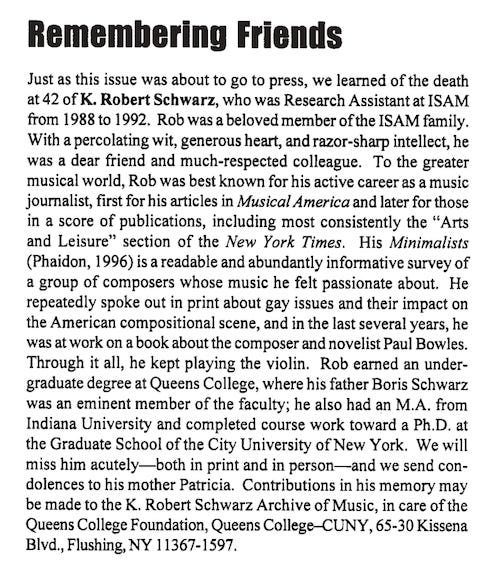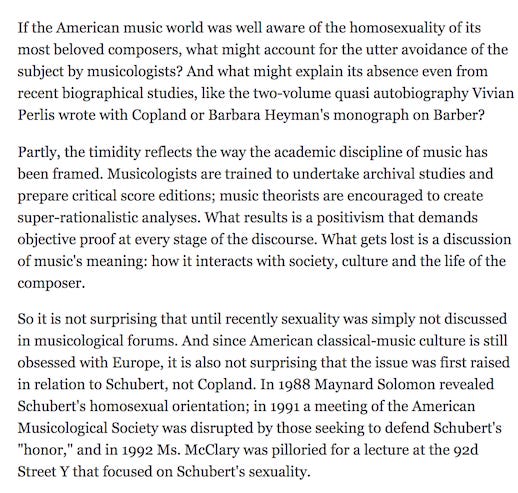listening to k. robert schwarz
In the past week-and-a-half, I have listened to about sixteen hours of interviews conducted by critic/writer/musicologist K. Robert Schwarz, over the phone and in-person, with composers in the late ‘80s and ‘90s. Honestly, I’m pretty much addicted. It’s like someone made a podcast specifically for me, to listen to while working on my book project — *finally, people are talking into my headphones about the exact thing I’m deeply invested in right now!* That means Milton Babbitt and Charles Wuorinen talking about how the media distorts the meaning of “serialism,” David Lang and Julia Wolfe talking about moving Bang on a Can to Lincoln Center, Jacob Druckman talking about the Met cancelling his opera commission.
There’s something peculiarly intimate about listening to someone else’s interviews. I get used to the rhythm of Schwarz’s inquiries, what tends to happen when people want to go off-the-record, hearing his cat meow or his telephone ring in the background. I have already read the published, end-result of the interviews, and so have a sense of why he’s asking the questions he’s asking, what the “big idea” he’s trying to get the interviewee to circle around to is.
The listening is laced with melancholy. Schwarz died in 1999, at the age of 41, from AIDS. When I posted about visiting the Schwarz papers on Twitter, a couple of his friends responded:

And I’ve heard warm recollections from others. But prior to a week ago, I knew Schwarz only from a distance, from reading his polished, long-form New York Times features. I will never have the privilege of knowing him personally. These interviews, though, are a window into…something.
It's hard to listen to hours of conversations led by someone you didn’t know, whom you know others loved, and whom you imagine you would have seen as a role model if he had lived longer. I probably would have written to him in college, and asked him to check out my blog, and sent him my Times articles, and tried to meet up with him at AMS, and convinced him to follow me on Twitter. Towards the end of an interview Schwarz conducted with Louis Andriessen in 1996, they get to talking about the fin-de-siècle, and the Dutch composer says that, by 2012, there would be a new kind of avant-garde, one that cannot yet be anticipated . Andriessen says that, by then, he will be dead, but the young critic won’t. It’s 2019, and Andriessen is still around; Schwarz passed less than three years after that conversation.
I’m glad, at least, to be able to hear his voice.
As to the book: these interviews are a fount of fascinating information, with many little tidbits that will weave their ways into the chapters I’ve already written, as well as what’s left to write. They’ve given me access to one of the things that I am always searching for in my research: composerly crosstalk. This has always been an integral part of my research, but often hard to obtain. I didn’t come up in composer circles, I don’t hang out with composers regularly, and so the information I do get tends to come from more formalized sources: archival materials, reviews, grant applications, oral histories, my own interviews. Schwarz’s interviews are filled with gossip-y moments where composers go off-the-record — sometimes these are recorded, and sometimes not — but even when they’re on-the-record, there are little asides, that don’t make it into Schwarz’s published writings, that help fill in crucial gaps.
An example, one that ended up being unexpectedly important: at the beginning of a long interview with Babbitt, the composer starts talking about how the critic Samuel Lipman, who wrote for Commentary and The New Criterion, incorrectly defined serialism in his writing. Babbitt makes clear in this moment that he was not only reading Lipman’s work, but friendly with him and on first-name terms. This is information I’ve not heard before. I’m writing about how Babbitt’s and Wuorinen’s writings in the mid-’90s clearly draw on and echo neocon rhetoric about multiculturalism espoused by Lipman: now I know there’s a direct link between them. A small connection is made.
It's also personally enlightening to see a bit of Schwarz’s working process — handwritten questions, typewritten questions, rough transcripts, handwritten and typewritten articles, even the edits sent back from the Times. To be honest, I'm not dwelling on that material much—if I were to write specifically about Schwarz in this project, I would, but I'm really using his materials as a source to gather information about the people he was talking to and writing about. Again, I do want someone to write about Schwarz — my book research has been a constant, internal wailing of "How has someone not yet written about this?! Can someone please write about this?!" (Followed by the occasional, "Okay, I will at least devote a page to this.") He will come up numerous times in the book, but he deserves his own spotlight too.
One more thing about Schwarz — and why he should get further attention. Along with being an incredibly prolific freelancer, he was also a public musicologist! He wrote an MA thesis on Steve Reich — the papers at Queens College probably have a lot of material that would be useful to Reich scholars — and was writing a PhD dissertation on Paul Bowles when he died. Schwarz worked at Brooklyn College’s legendary Institute for Studies in American Music, and also published a great book on minimalism. This is what Carol Oja wrote in 1999:

I don’t know much about Schwarz’s academic work, or whether he was a regular at conferences, but what I admire about his public writing is how it’s informed by musicological insights, translating them for a broader Times readership. He wrote frequently about gay composers, and documented how the AIDS crisis affected music. And he brought New Musicology’s discussions of music and sexuality into the public eye in this deep, still-revelatory dive:

FYI, this seems very undergrad-assign-able for explaining the direction of musicology in the ‘90s! (Don’t miss the irate response from Copland’s cousin.)
Schwarz strikes me as an interesting counterpart to the much more publicly musicological, and publicly combative, Richard Taruskin, who was writing in the Times in this same period. But Schwarz is much more the chronicler than the polemicist, and, to be honest, that’s also where my own preferences tend to fall when approaching public writing.
A few more of Schwarz’s Times articles that are great reads:
A response to Tony Tommasini’s review of an OUT Classics album (for which Schwarz wrote notes)
On Jacob Druckman’s opera plight
On an unrelated note, my paper “Multiculturalism, Neoconservatism, and New Music’s Marketplace Turn amidst the Culture Wars” was accepted for the Society for American Music conference in Minneapolis next March! Yay!
Here’s the abstract:
"Are you apprehensive about what the politics of 'multiculturalism' is going to mean to the future of our civilization?" asked a 1990 mailer for The New Criterion. The neoconservative journal was seeking out new subscribers amidst the Culture Wars, a referendum on the role of government funding of the arts. And though the focal point of right-wing ire was visual artists like Robert Mapplethorpe, the Culture Wars and conservative attacks on multiculturalism had significant consequences for American composition, which have not yet been scrutinized by scholars.
This paper examines how the Culture Wars were refracted in new music, through an analysis of a major debate around the New York State Council for the Arts. In the early 1990s, the Council introduced program guidelines advocating for grantees to take a multicultural and audience-focused approach, which incited indignation among musicians such as the neoconservative composer Charles Wuorinen. Drawing on archival research, interviews, and reception, I trace how these changes in government funding shaped the differing fates of two new-music institutions: the decline of the Group for Contemporary music, a pioneering ensemble co-founded by Wuorinen that emerged during the ’60s wave of funding for academic new music; and the ascent of Bang on a Can, a market- and multicultural- friendly organization that expanded dramatically in the early ’90s. Examining the intertwined paths of these two institutions, I argue, reveals the decline of Cold War logics that shaped midcentury American modernism and the rise of a marketplace turn in American composition.
I’m really excited to start presenting this work in the coming academic year, which is based on Book Chapter 4, and deals with Bang on a Can and new music’s funding landscape of the ‘90s amidst the Culture Wars. The SAM paper is an extremely truncated version of the chapter, focusing specifically on the New York State Council for the Arts and issues around multiculturalism (this is where the Babbitt/Lipman stuff plays out). The longer chapter (and a longer talk) deals with the NEA, Mapplethorpe, Jesse Helms, and all that craziness. If you’re interested in hearing about that at your colloquium, please let me know!! I’m hoping to present it a bunch, and get feedback.
That’s it, friends — see you next week!




